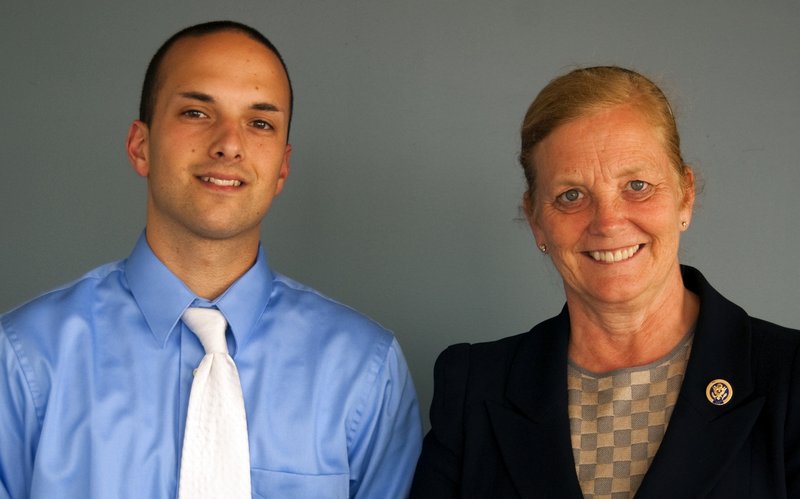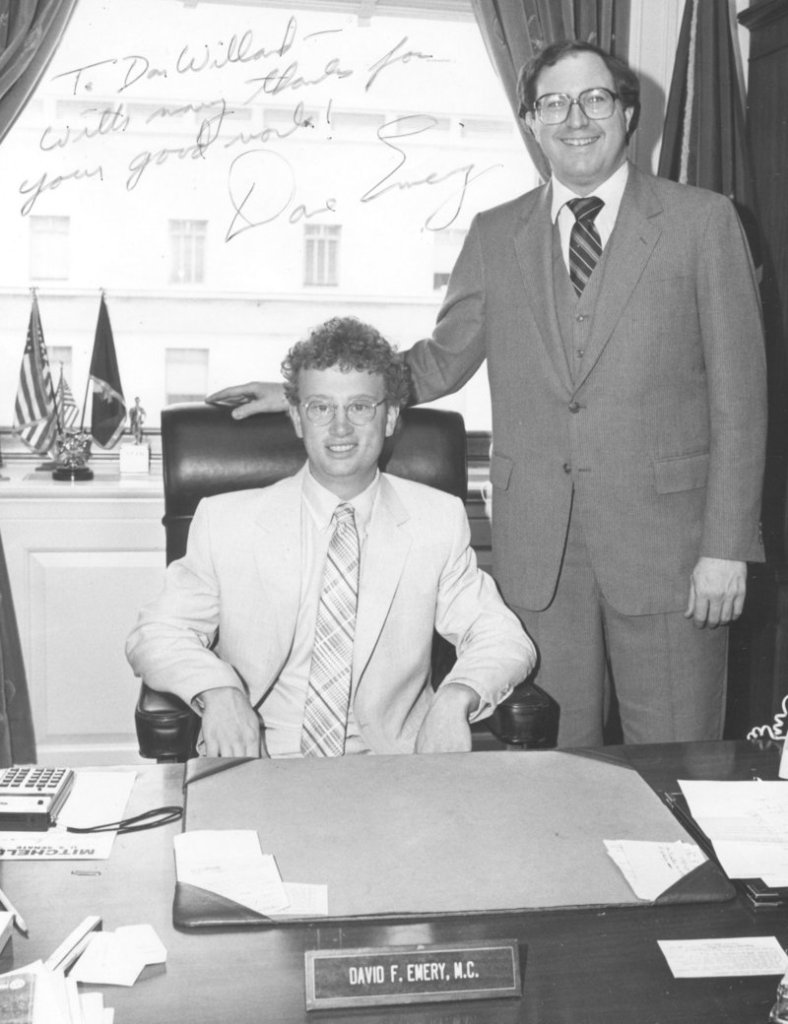Is Capitol Hill a good place for young people?
I pondered the question recently after receiving an unusual invitation from Don Willard, the longtime town manager in Raymond.
Willard served as a congressional intern way back in 1982 while he was a senior majoring in public administration at the University of Maine.
He’d just received an e-mail from Lorraine Marro of Buxton, an old high school friend. Her son, Joe, a junior at UMaine majoring in international affairs, is spending this spring in Washington doing the same thing.
“She saw my name on the list of past interns and wants to know if I’d have time to chat with her son while he’s home visiting,” Willard said. “Want to sit in?”
I thought about it for a few moments. Two views of the most powerful city in the world, both through the eyes of a kid from Maine occupying the bottommost rung on the political ladder, separated by almost three decades?
“Count me in,” I replied.
A little history: Since its founding by Professor Edward Dow in 1959, UMaine’s congressional internship program has dispatched almost 250 students from Orono to Capitol Hill.
Dow, eager to complement his top students’ class work with an up-close-and-personal view of the federal government, found enthusiastic support for the program from then-Maine Sens. Edmund Muskie and Frederick Payne. Subsequent members of Maine’s congressional delegation, much to their credit, have kept the welcome mat out ever since.
“You really need to be self-motivated,” said UMaine political science Professor Richard Powell, who now oversees the program. “You’re away from campus. You’re in a workplace environment. Professionalism and communications skills are really critical as well.”
Cynics, now more than ever, might call it low-paid grunt work at best and, at worst, an early immersion in all that is wrong with our democracy.
Not so, according to these two interns.
Willard, 51, can still remember heading for his first day of work for Republican U.S. Rep. David Emery.
“I’m walking out of the subway in my $50 Sears suit,” he recalled. “I remember just standing there, looking around at the Mall, the monuments. I felt like I was 10 feet tall and bulletproof.”
Marro, 21, works for U.S. Rep. Chellie Pingree, a Democrat. His first day, he gazed at the Capitol dome and thought to himself, “Wow. This is about as far from Buxton and Orono as you can get.”
Times, to be sure, have changed.
Back when Willard arrived, the cutting edge in journalism was a newfangled newspaper called USA Today. And Emery’s staff was all abuzz over a new piece of “cutting-edge technology” that had just arrived in the congressman’s office.
“I’d never seen one before,” Willard said with a chuckle. “It was called a ‘facsimile machine’ and it could transmit documents all the way from Maine, the edge of the earth, over the telephone lines!”
Today, Marro gets his news in real time on his computer. And he can count on one hand the number of times he’s even heard the word “fax.”
“Most of the members (of Congress) have Twitter pages, Facebook pages, YouTube pages,” he said. “That’s how they get messages out to their constituents. And the constituents respond directly back.”
Back then, Willard took a fellow intern’s dare one evening and climbed the fence outside the White House.
“The Secret Service came running,” he recalled.
And?
“They asked me to get off the fence. That was it.”
Marro, on the other hand, was recently dispatched to deliver a letter from Pingree’s office in the Longworth House Office Building to House Minority Leader Nancy Pelosi’s office in the Capitol.
“I had to show my badge probably 40 times,” he said. “At every turn, there’s someone asking, ‘Where’s your badge? Where’s your badge?’ “
Technology and security jitters aside, some things in the life of an intern never change.
The monthly pay — about $500 for Willard and $1,350 for Marro — supports anything but the high life. The solution then and now: Attend every la-di-da reception you can talk your way into.
“The staffers are all networking, everyone’s talking, maybe having a glass of wine,” Marro said. “And I’m standing over there at the food table — having dinner.”
Nor are the digs anything to write home about — Marro lives in not-so-spacious intern housing within sight of the Capitol, Willard endured a basement flat in a George Washington University fraternity that had no hot water, no kitchen and no shower.
“I remember my parents came down to visit and I met them outside,” Willard said. “The place was so bad I didn’t want them to see it.”
But if there’s one constant that spans the decades for the lowliest of Washington’s lowly, it’s that occasional moment you just don’t experience as a tourist. Or, for that matter, as one of those faraway keyboard critics who repeat ad nauseam how nothing good, nothing worthwhile, nothing honorable ever comes out of the federal government.
Willard will never forget the time a young girl from Maine won the state’s Voice of Democracy essay contest and he, by default, was assigned to write a short tribute to her and have it read into the Congressional Record.
“Now remember, the Congressional Record is millions of pages,” he said. “But on page whatever, back in 1982, I left my mark.”
Late one afternoon just a few weeks ago, Marro was asked by Pingree to track the frenzy of activity surrounding the continuing resolution needed to keep the federal government from shutting down. It was a daunting task — Marro spent hours laboring over the spread sheet of amendments, votes and other parliamentary maneuvers.
“But I got through it and (Pingree) was really happy about it,” he said. And going home that day, he thought, “All right. I’m doing things that are actually helping the office. I’m making a difference — I’m not just an intern getting coffee.” Willard’s internship helped launch him on a career in local government — in addition to Raymond, he’s served as town manager in Dixmont and Rockport.
“It was a catalyst. It galvanized my desire to serve in local government,” he said. “Being in a job where no two days are the same and it’s all about helping people, solving problems and trying to make a difference in your small town — that’s a pretty good life.”
Marro’s not sure where he’s headed after he graduates from UMaine next year. But he wouldn’t mind returning to Washington, perhaps landing a gig in foreign relations.
Even now? Even when people who haven’t been there and haven’t done that ask him, “Why government? Why work in that mess?”
Marro smiled.
“I tell people I’m not trying to get into government just to get a good-paying job,” he said. “I want to push for what I believe in, what I stand for, what I think would make the country better.”
He hesitated for a moment. Interns, after all, aren’t supposed to make speeches.
“Maybe that’s a far-fetched idea,” Marro finally added with a tinge of youthful apology.
A far-fetched idea? Far from it, kid.
It’s called — one wide-eyed internship after another — our future.
Columnist Bill Nemitz can be contacted at 791-6323 or at:
bnemitz@mainetoday.com
Copy the Story Link
Send questions/comments to the editors.




Success. Please wait for the page to reload. If the page does not reload within 5 seconds, please refresh the page.
Enter your email and password to access comments.
Hi, to comment on stories you must . This profile is in addition to your subscription and website login.
Already have a commenting profile? .
Invalid username/password.
Please check your email to confirm and complete your registration.
Only subscribers are eligible to post comments. Please subscribe or login first for digital access. Here’s why.
Use the form below to reset your password. When you've submitted your account email, we will send an email with a reset code.